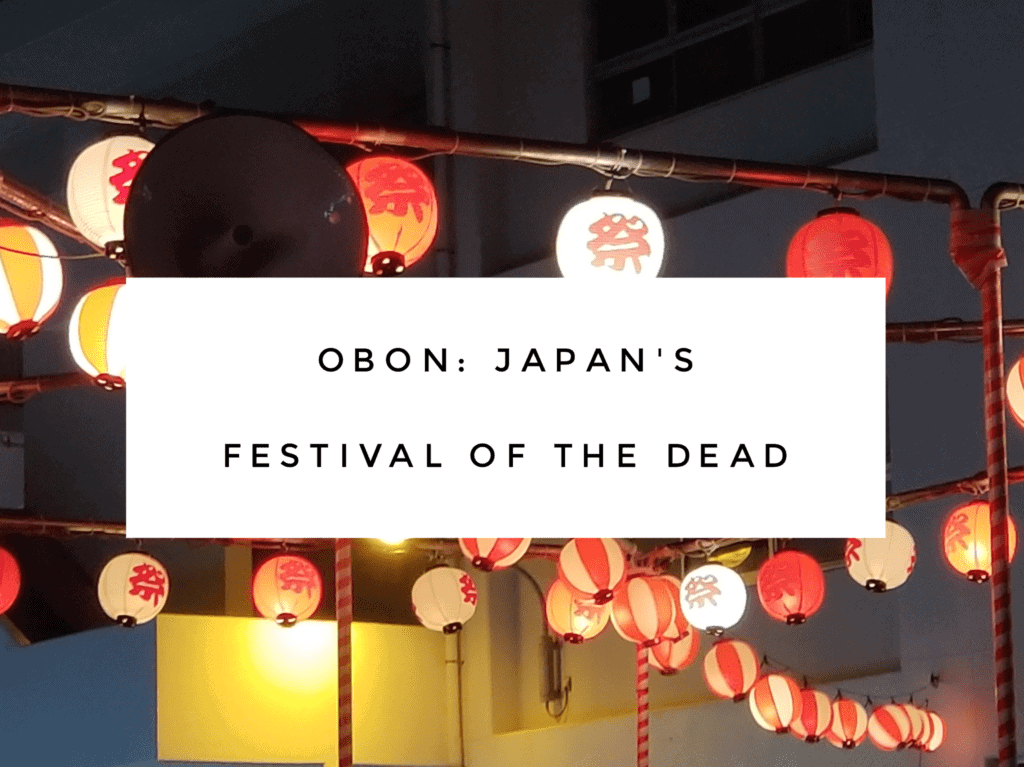If you are in Japan in August, most likely you will stumble upon a festival in the evening time. Obon – Japan’s Festival of the Dead, was officially from August 13th to 16th in 2018 but can vary by region. It is a series of events that enshrines the spirits of the ancestors. One of those ancient events that interest me as so many cultures around the world
Every year, my work place of roughly 2000 Japanese nationals and a couple hundred American’s invite their friends and families for a celebration. I noticed while I was talking with some of my Japanese coworkers that some paperwork they had very much did NOT say “Obon” or ” お盆” and we started discussing. I’ve only missed one year in the past five, colloquially, the American’s call it “bon”. What was this 納涼大会??? And this is why I love learning about different cultures and languages. Let me set the scene…
Summer Festival: A quick Japanese lesson
Let’s break down my work’s yearly events actual name:
納涼, noryo, summer night or literally escaping the summer heat. The way my coworker’s explained it (and this took some work as conveying things that don’t translate quite right is a game we like to play, both from English and from Japanese), in days of old a rich man that has the money to go, would leave the city and relax in the mountains where it was cooler. Those with no money or time to escape, still obviously wanted in on the deal. So they have cold drinks, etc. to feel cool and relax during the summer evenings.
大会 – taikai, convention or big meeting. That ones pretty straight forward.
So the event is actually “the big summer night meeting to escape from the heat”.
Now, let’s talk about Obon – Japan’s festival of the dead.
Or bon-odori as sometimes we American’s also call this event at work.
お盆 is shortened from the Chinese 盂蘭盆會うらぼんえ(會 is the complicated version of 会 and means conference, the native Japanese speakers say you rarely see that kanji anymore) and originates with a disciple of Buddha trying to retrieve his mother who had after dying fallen into the realm of Preta which is the Sanskrit name for a supernatural being in lots of folk religions that means they are going through a huge amount of suffering. Making offerings to monks during their summer retreats, he was able to free his mother and danced for joy. That’s how we got bon odori, or bon dance, 盆踊り, festival of the dead dancing, and how this all happens to take place during the month of August.
盆, bon, itself means “tray”. (See what I mean about not being directly translatable??). Add an “お” on the front of it and it’s the honorific version. It’s shortening down from “lantern festival” and that’s why you’ll see many lanterns during obon events as well as some of them are merely lantern events like this one I mentioned in Asakusa.
Buddhist tradition has families visit ancestral homes and clean the graves. And make offerings…. on trays. See? Everything comes full circle. Belief is that spirits revisit the alter, very similar to the day of the dead in Mexican tradition and I’m sure other places around the world I don’t know about yet.
All summer festivals are 納涼大会 but not all summer festivals are Obon.
See, this is what I love about learning a language. You understand subtle cultural nuances that you wouldn’t without the understanding of what’s behind them.
So, what’s the event at work?
You may be asking. It’s the largest by far of the four we have every year (summer festival, employee recognition, Christmas, and New Years), and it’s basically a big block party, like a bon festival you may see. There are food booths, drinks, music, games for the kids. And this… the bon dance.
[embedyt] https://www.youtube.com/watch?v=frZPZbNQH_8[/embedyt]
Now, try and get that song out of your head ;). Very much like Yosakoi has a song that must be used in competition, this is the bon song and you won’t go to a festival without hearing it. You’ll also find it being played on the shopping street PA systems during the summer.

It’s also an excuse for me to wear my yukata as I can’t put it on without help. Pretty common issue in general, so I take advantage of it.

The lanterns may be one of my favorite parts.

Everyone forms a large circle around the stage for, lack of a better term, the circle dances that occur. They are traditional steps passed on for years that are not too hard to pick up but my work offers classes during lunch leading up to the summer festival.

What’s your experience with summer festivals? My favorite will always be Yosakoi!
